Unit2 Catching the Olympic Spirit
必修二unit2Reading

2021/10/10
6
New words
stadium 露天大型体育场
2021/10/10
7
Olympic torch 火炬
2021/10/10
8
The Olympic Games
Summer Olympic Games Winter Olympic Games
Hold for?
honor
2021/10/10
18
ver the world
both medals
Yes
More events
No only in Greece
only men olive wreath
No Less events
19
1. Where do all the competitors live? B
24
Answer the following questions.
1. What amazes Pausanias about the Olympic Games?
--Pausanias is amazed that many countries take part in the Olympic Games
--and women too --and there are two sets of Games – the
Winter and the Summer Olympics.
2021/10/10
25
2. Why does he think Athens and Beijing should feel proud? Because Li Yan has explained that it is a great honour to host the Olympic Games.
高中英语必修二-unit2-the-olympic-games
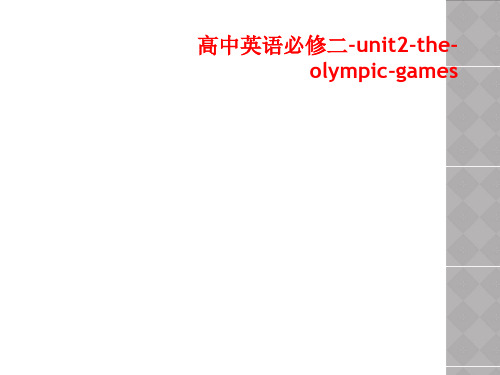
I’ve come to your time to find out about the _p_re_s_e_n_t_-d_a_y__ Olympic Games.
Task1: Skimming What questions does Pausanias ask?
The Summer Olympics The Winter Olympics
Sets every four years
two years before the Summer Games
running races, swimming Time sailing, team sports
skiing, ice skating
Q4: Where are all the athletes housed?
• special village • reception building • stadium • gymnasium
Task2: Scanning
Q5: Dose anyone want to host the Olympic Games? It’s a great __r_e_sp_o_n_s_i_b_il_itybut also a great _h_o_n_o_rto be chosen.
Q1: How often do you hold your Games? Q2: How can the runners enjoy competing in winter? What about the horses? Q3: Do you mean the Greek world?
Q4: Where are all the athletes housed? Q5. Dose anyone want to host the Olympic Games?
高中英语 Unit2 The Olympic Games教案
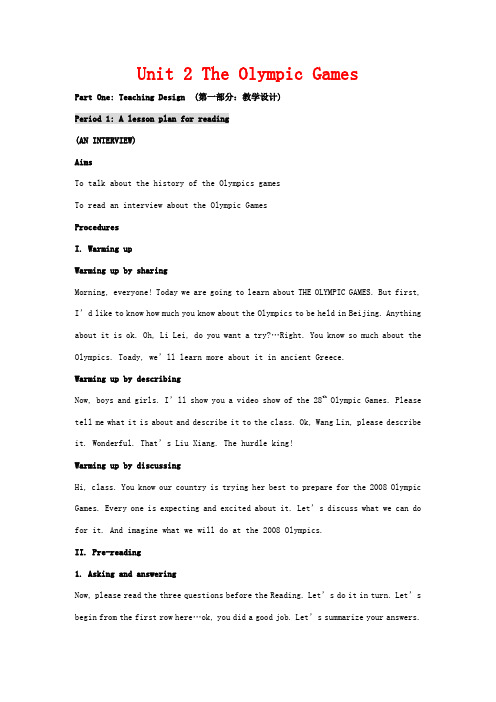
Unit 2 The Olympic GamesPart One: Teaching Design (第一部分:教学设计)Period 1: A lesson plan for reading(AN INTERVIEW)AimsTo talk about the history of the Olympics gamesTo read an interview about the Olympic GamesProceduresI. Warming upWarming up by sharingMorning, everyone! Today we are going to learn about THE OLYMPIC GAMES. But first, I’d like to know how much you know about the Olympics to be held in Beijing. Anything about it is ok. Oh, Li Lei, do you want a try?…Right. You know so much about the Olympics. Toady, we’ll learn more about it in ancient Greece.Warming up by describingNow, boys and girls. I’ll show you a video show of the 28th Olympic Games. Please tell me what it is about and describe it to the class. Ok, Wang Lin, please describe it. Wonderful. That’s Liu Xiang. The hurdle king!Warming up by discussingHi, class. You know our country is trying her best to prepare for the 2008 Olympic Games. Every one is expecting and excited about it. Let’s discuss what we can do for it. And imagine what we will do at the 2008 Olympics.II. Pre-reading1. Asking and answeringNow, please read the three questions before the Reading. Let’s do it in turn. Let’s begin from the first row here…ok, you did a good job. Let’s summarize your answers.2. Imaging and introducingPlease look at the three pictures in the reading. Please talk about them. Imagine whatever you can.3. Talking and SharingWe know there are many differences and similarities about the ancient and modern Olympics. Do you know anything about them? You can simply guess. Yes, Lucy, try …III. Reading1. Reading aloud to the recording and finding the general ideaNow please listen and read aloud to the recording of the text AN INTERVIEW. Pay attention to the pronunciation and intonation as well as the pauses within each sentence. Then try to get the general idea of the passage. Have you got the main idea?Yes, it tells us the differences and the similarities between the ancient and modern Olympics.2. Reading and actingNow let’s play the parts of the Greek writer Pausanias and the Chinese girl Li Li. Now boys, you are Pausanias; girls, you are Li Li. Please pay attention to the bold words.3. Reading and findingNow read the text again. The boys shall try to finish the task: What was the ancient Olympics like? The girls shall try to finish the task: What is the modern Olympics like?4. Reading and collecting informationOk, now let’s read it silently. First let’s talk about the same points between the ancient and modern Olympics. Who can answer? Any volunteers?Then let’s come to the differences.5. Reading and underliningNext you are to read and underline all the useful expressions or collocations in the passage. Copy them to your notebook after class as homework.Ⅳ Closing downClosing down by doing exerciseTo end the lesson you are to do the comprehending exercises 1 & 2.Closing down by discussingYou know our government has tried its best to compete for hosting the 29th Olympic Games. It has cost a lot of money. Do you think it is worthwhile? Why?Closing by imaginingImagine what we will do and what we can do for the 29th Olympic Games now.Closing down by narratingWe can see the text is written in a conversational style. And there are two speakers. One is Pausanias, a Greek writer 2000 years ago, the other is Li Li, a Chinese girl.Now let’s change it into a narrative style. In other words, let’s describe the ancient and modern Olympic Games in our own words. Who would like to have a try?Closing down by summarizingAs we have finished the passage we’ll sum up what we have learned. First let’s see the writing skills. It is written in a conversational style. It’s in a very interesting way. It adopts a dialogue between Pausanias who lived 2000 years ago and a Chinese gird in modern world. Through their dialogue, the differences and similarities between the ancient and modern Olympic Games are made known to the readers. Just because it is in a conversational style, there are quite a few oral spoken English and elliptical phrases.Through the comparison between the ancient and modern Olympic Games, we have learned the differences and the similarities between them. Now we can have a deep understanding of the Games. From the passage, we can have a deep understanding of the Games. From the passage, we can also get to know that the Olympic Games are developing and improving. It’s our duty to make the Olympic Games better and healthier. We know that one of the slogans for 2008 Beijing Olympic Games is Green Olympic Games. It shows that people are paying more and more attention to our environment.Period 2: A lesson plan for Learning about Language(The Future Passive Voice)Aims:To learn about future passive voiceTo discover useful words and expressionsTo learn the methods of words formationProceduresI. Warming upWarming up by dictatingThere are several important sentences in this unit. Let’s dictate them. If you ca n’t, learn them by heart after class.①When and where will the next Olympic Games be held?②I live in what you call “Ancient Greece” and / used to write aboutthe Olympic Games more than 2000 years ago.③All countries can take part if they reach the standard to be admittedto the games.④The next Olympic Games will be held in my hometown.⑤It is just as much a competition among countries to host the Olympicsas to win an Olympic medal.Warming up by discovering useful words and expressionsTurn to page 11 and do exercises 1, 2, 3 and 5 first. Check your answers against your classmates’.II. Learning about word formation1. Do exercise 4 and discover the rules.Turn to page 12 and find out the rules of word formation.By adding -ing to a verb, we can change the verb into a noun.That means we can change “doing some sport” into “the name of the sport”.By adding -er to a verb, we can change the verb into a noun. That means we can change “doing some sport” into “the person who does the sport”.2. Means of word-formation in generalAffixation, conversion, and composition (or compounding) are the chief means of word-formation in English. Besides these, there are also other minor ways of word-formation including clipping, acronymy, blending etc.III. Learning about Present Future Passive VoiceTurn to page 13 and do exercise 3. And tell the class the formation of present future passive voice.Ⅳ Closing down by summarizing1.Present future passive voice (take “ask” for example)2.The passive Voice of phrasal verbGenerally speaking, only transitive verbs can form the passive voice, for only transitive verbs can be followed by objects. But many intransitive verbs together with some prepositions and adverbs can be used as transitive verbs. So they can also be followed by the objects. Therefore they can also be used in passive voice.But note that all the phrasal verbs are used as a whole. When using them in passive voice, we cannot drop out the prepositions and adverbs. For examples:At last they put out the fire. At last the fire was put out.They will put up a notice on the wall. A notice will be put up on the wall. Have you sent for a doctor? Has the doctor been sent for?I have never heard of such a thing before. Such a thing has never been heard of before.We must take good care of the children here. The children must be taken good care of here.His classmates laughed at him for the foolish mistake. He was laughed at for the foolish mistake by his classmates.Period 3: A lesson plan for using languageAims:To read about the ancient Olympic GamesTo listen and talk about hobbiesTo write about hobbiesProcedures1. Warming upWarming up by introducingHi! Class. You know Greece is the world-known country with an ancient civilization. It has a long history with so much marvelous culture. The Greeks had wonderful stories about the Gods and Goddnesses who were part of their religion. They believed that these god or goddesses would help humans if they felt sorry for them or if the humans were good people. However, the Gods did not always help. They behaved like people who were unpredictable and capricious. To try to get the support of the Gods people had to pray to them and offer them present. In this story the Goddess Hera, the wife of the chief God, Zeus was sorry for Hippomenes and agreed to help him.Warming up by sharingNow, boys and girls. Is there anybody who can tell us some Greek mythology. You know they are so famous in human history. Or can you speak out some names of Greek Gods and Goddesses.Ⅱ. Guided reading1. Reading and judgingRead the text THE STORY OF ATLANTA, and complete the True or False guestions after the text on page14.2. Reading and answeringRead the text again, and answer the following questions.A. What was Atlanta’s problem?B. What were Atlanta’s rules?C. What was Hippomenes’ amazement?D. What made Hippomenes change his mind?E. Whom did Hippomenes turn to for help?F. Can you guess what was the ending?3. Reading and underliningNext you are to read and underline all the useful expressions or collocations in the passage. Copy them to your notebook after class as homework.4. ListeningFor listening turn to page 15 and be ready to do exercises 1.First read the questions carefully and imagine what is the listening about. When doing exercise 2, you must make clear what is wrong with the sentence. And tell the class which is correct, which is wrong and which is only half true.5. ActingNext we are going to put the text A STORY OF ATLANTA on stage. You know there are four charactors in the story. Who would like to be them?Who will be Alanta’s father, the old king?Who will be the Goddess of Love?Ok. Li Li, you are the Greek princess. Zhang Qiang, you are the brave young man Hippomenes. Lucy, you are the Goddess of Love. Zhou Gang, you are the princess’s father. The rest of class, please prepare it in groups of four. Then act your play before class.6. SpeakingNow, class. Let’s carry out a survey of the interests in the class and write down the names of the classmates who have the same interests. You can carry out the task like this.Which do you like, sport, music or collection?Which of the sports do you like best?What is your favorite sport?Are you interested in table tennis?After the survey, the ones who have the same interests sit together and please work in groups of four to talk about their interest.III.Guided writing1. Writing an imagined dialogueGroups 1 and 2 are going to write an imagined dialogue between the princess and Hippomenes. You may begin like this : Oh, my dear princess, I want to marry you…2. Writing a descriptionTurn to page 16 and follow the direction to write a description of your favorite hobby.Here is an example:IV. Closing down by finding informationGo to the library to read or get online to search in order to find more information on the Olympic Games and the ancient Greek mythology. Take notes of your finding and report to your groupmates next Monday morning.Part Two: Teaching ResourcesSection 1: The writing style of the reading AN INTERVIEWSection 2: Background information on the Olympic GamesI. Events of the Moden Olympic GamesArchery, Baseball, Badminton, Basketball, Beach, Volleyball, Boxing, Canoe/Kayak, Cycling, Diving, Equestrian, Fencing, Field Hockey, Gymnastics, Handball, Judo, Modern Pentathlon, Rowing, Sailing, Shooting, Soccer, Softball, Swimming, Synchronized Swimming, Table Tennis, Tennis, Tae kwon do, Track & Field, Triathlon, Volleyball, Water Polo, Weightlifting, WrestlingII.Olympic TraditionsThe Olympic AnthemThe Olympic anthem was written by the Greek national poet Costis Palamas and composed by Greek musician Splros Samaras. It was first sung at the 1896 Games. The IOC adopted it as the official Olympic anthem to crown olympic ceremonies at the 1958 IOC Session in Tokyo.The Olympic MottoThe Olympic motto “swifter, higher, stronger”comes from three Latin words”citus, altius, fortius”, which actually mean”faster, higher, braver”. The French educator, Baron Rerre de Coubertin, who revived the ancient Olympic Games and in 1896 led the first modern 01ympic Games in Athens, borrowed the phrase from a Dominican priest Henri Dinon. Mr.Dinon introduced these words while presenting athletic prizes at a college in 1891.But how did these words become the motto of the Olympic Games? It was Michel Breal who introduced this phrase at the closing dinner of the congress for the reestablishment of the modern Olympic Games on June 23,ter, the International Olympic Committee formally adopted this phrase as the official motto of the Games.The Olympic CreedThe Olympic creed was also introduced at the 1896 Games. As stated by Pierre de Coubertin, the creed is as follows:”The most important thing in the Olympic Gamesis not to win but to take part, just as the most important thing in life is not the triumph but the struggle. The essential thing is not to have conquered but to have fought well.”The Olympic FlagIt was Pierre de Coubertin who conceived the idea of the Olympic flag with five coloured interlocking rings on a white backround. The rings represent the union of the five continents and the meeting of the athletes from all around the world at the Olympic Games.Today, almost a century after the flag’s creation, the six colours, those of the rings (blue, yellow, black, green, red) and that of the white background which stands for peace, still maintain their symbolism and can be found in flags across the world. The Olympic flag was first used during the Antwerp Games in 1920.The Olympic Oath“In the name of all the competitors, I promise that we shall take part in these Olympic Games, respecting and abiding by the rules which govern them, in the true spirit of sportsmanship, for the glory of sport and the honour of our teams.”At the opening Ceremony of each Games, one athlete from the host country takes Olympic oath on behalf of all competing athletes. This particular gesture of sports-manship was introduced at the 1920 Games in Antwerp, Belgium. A coach or team official takes a similar oath at each Opening Ceremony.The Olympic FlameThe Olympic flame is one of the most visible symbols of the modern Games. Its tradition has survived from the Games of ancient Greece, where a sacred flame, ignited by the sun, burned continually on the altar of the goddess Hera.The modern Olympic flame was first lit in 1928 at the Amsterdam Olympic Games, where it burned throughout the competitions. It has become a major symbol for solidarity among nations and embodies the Olympic spirit encompassing the ideals of purity,the endeavour for perfection, the struggle for victory, friendship and peace. The Torch RelayDuring the 1896 Games in Athens, young inspired sportsmen had organised the first torch relays. However, the tradition of the Olympic torch officially began at the Berlin Games in 1936. As in ancient times, the torch is lit by the sun in Ancient Olympia, then passed from runner to runner in a relay to the host city, where it is used to light the Olympic Stadium’s flame during the Games’ Opening Ceremony. The flame then burns until it is extinguished at the Closing Ceremony.Section 3: Words and expressions from unit 2 THE OLYMPIC GAMEShonestadj. 1. not disposed to cheat or defraud; not deceptive or fraudulent: honest lawyers2.marked by truth: give honest answers 3.without pretensions: worked at an honest trade4. without dissimulation; frank: my honest opinion5. habitually speaking the truth: an honest man 6. worthy of being depended on: an honest working staff 7. free from guile: His answer was simple and honestancientadj. 1. very old: an ancient mariner 2. in or of times long ago: ancient Rome and Greece 3. having existed since a very early time: ancient history/customs competev. to try to win sth. in competition with someone else: John competed for a place at their school, but didn’t get it. compete for something; engage in a contest; measure oneself against othersmedaln. an award for winning a championship or commemorating some other event hostn. a man who receives guests: He acted as host to his father’s friends. China is the host country for 2008 Olympic Games. v. be the host of or for: We hosted4 couples last night.magicaladj. possessing or using or characteristic of or appropriate to supernatural powers: a magical spellinterviewn. 1. the questioning of a person (or a conversation in which information is elicited); often conducted by journalists: My interviews with teen-agers revealed a weakening of religious bonds.2. a conference (usually with someone important) v. 1. conduct an interview in television, newspaper, and radio reporting 2. discuss formally with (somebody) for the purpose of an evaluation: We interviewed the job candidates. 3. go for an interview in the hope of being hired: The job candidate interviewed everywhere.athleten. a person trained to compete in sportsadmitv. 1. allow participation in or the right to be part of; permit to exercise the rights, functions, and responsibilities of: admit someone to the profession 2. allow to enter; grant entry to: We cannot admit non-members into our club.3.serve as a means of entrance: This ticket will admit one adult to the show.4.give access or entrance to: The French doors admit onto the yard.5. afford possibilitye: This problem admits of no solution.6. declare to be true or admit the existence or reality or truth of: He admitted his errors.7.admit into a group or community: We’ll have to vote on whether or not to admit a new member.8. have room for; hold without crowding: The theater admits 300 people.replacev. 1. put something back where it belongs: Replace the book on the shelf after you have finished reading it.2. substitute a person or thing for (another that isbroken or inefficient or lost or no longer working or yielding what is expected): He replaced the old razor blade. 3. put in the place of another; switch seemingly equivalent items: The con artist replaced the original with a fake Rembrandt.4. take the place or move into the position of: Smith replaced Miller as CEO after Miller left.relatev. 1. have or establish a relationship to: She relates well to her peers.2. be in a relationship with: How are these two observations related?3. give an account of: The witness related the events. 4. have to do with or be relevant to 5. make a logical or causal connection: I cannot relate these events at all.sailn. 1.a large piece of fabric (as canvas) by means of which wind is used to propel a sailing vessel 2. an ocean trip taken for pleasure v. 1. traverse or travel by ship on (a body of water): We sailed the Atlantic2. travel in a boat propelled by wind: I love sailing, especially on the open sea.3. travel by boat on a boat propelled by wind or by other means: The QE2 will sail to Southampton tomorrow.4. move with sweeping, effortless, gliding motions: Shreds of paper sailed through the air.advertisev. 1. call attention to: Please don’t adver tise the fact that he has AIDS.2. make publicity for; try to sell (a product)promisen. 1.grounds for feeling hopeful about the future: There is little or no promise that he will recover.2. a verbal commitment by one person to another agreeing to do (or not to do) something in the future v. 1. give grounds for expectations: The results promised fame and glory. 2. make a promise or commitment 3. promise to undertake or give: I promise you my best effort.4. make a prediction about; tellin advance。
必修二英语第二单元Unit2_The_Olympic_Games

New Beijing Great Olympics
Green Olympics People’s Olympics High-Tech Olympics
the Olympic motto
Swifter Stronger
Higher
What events(比赛项目) are there for the Summer Olympics?
1.Encourage ourselves and other Chinese to plant more trees and grass.
2.Have good manners in public so as to leave a good impression on foreigners 3.have a good knowledge of English and encourage the public speak English widely
3.Whe does Pausanias think Athens, Greece and Beijing, China should feel proud? They both win the right to host the Olympic Games.
4.Why does Pausanias think people may be competin for money in the modern Olympic Games? 、、、, even the olive wreath has been replaced.
4.Be Volunteers to be guides for foreigners 5.Learn the spirit of the Olympic Games and regard its motto as life and study motto
高中英语Unit 2《The Olympic Games》课件(2) 新人教版必修2

Ⅲ.The Olympic Creed(信条,教条)
"The most important thing in the Olympic Games is not to win but to take part, just as the most important thing in life is not the triumph, but the struggle. The essential thing is not to have conquered, but to have fought well."
One world ,one dream Green Olympics Hi-tech Olympics
Slogan: Theme:
People’s Olympics
ks5u精品课件
ks5u精品课件
Olive tree branch
ks5u精品课件
Ⅵ. the 29th Olympic Games
When: Where: Aug8th.2008
Beijing (Qingdao/ Hongkong / Qinghuangdao/Shanghai/Sheng yang/Tianjin)
ks5u精ቤተ መጻሕፍቲ ባይዱ课件
basketball
ks5u精品课件
Weight-lifting
ks5u精品课件
Table tennis
ks5u精品课件
gymnastics
ks5u精品课件
1.Talk about the knowledge of the Olympic Games and discuss it. 2.Write a passage on “the effects of the Olympic Games on Beijing”.
人教版高中英语 必修二 Unit2 《The Olympic Games ---Reading》 课
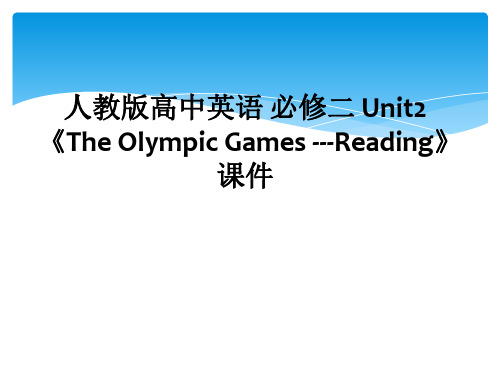
Olympic Games.
(T )
5. We feel proud because we have finally
got the chance to hold the Olympic
Games.
(T )
6. Horse riding events belong to the
A(
) village is built for competitors to live in,
a ( ) for competitors, a large swimming pool, a
( ) as well as seats for those who watch the
games. The oliver wreath has been ( ) by
the ( ) olympics. both of them are held every (
).All countries can take ( ) if their athletes
reached the standard to the game. Women are not
only ( ) to join in but playing a very ( ) role.
Medals
1. having running races 2. held every four years 3. no prize money for winners 4. the same motto: Swifter, Higher and
Stronger 5. seen as most important competition
高中英语必修2unit2TheOlympicGames
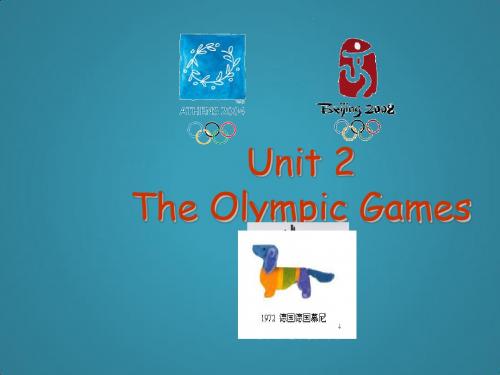
Sets(kinds) Only Summer Both Summer and Olympics Games Winter Olympic Games
Host city Athens in Greece
many cities in the world
Athletes only men
anybody reachingthe standard
Who What What What What
was interests surprises amazes pleases
Pausanias? Pausanias? Pausanias? Pausanias? Pausanias?
Find some key words of the “Reading” to catch the main idea.
Let’s enjoy!
Homework
Search for more information about Olympics on net:
Thank you for attending!
Track Long running,100m races: running,4×100 relay race… …
Field High jumping, long jumping, races: shot-putting,discus-throwing… …
Some Diving, boat-race, sailing, more: free-gym, shooting… …
Events
A few
hundreds of kinds
•Listen to the tape
and then finish the Ex1. in Comprehending, Page 11
人教版高中英语 必修二 Unit2 《The Olympic Games ---Reading》

2. Which of the following is included in the Winter Olympic Games? A. Skiing and ice skating. B. Running and races. C. Horse riding. D. Swimming.
3. Why do so many countries want to host the Olympic Games? A. To run faster, jump higher and throw further. B. To get a great honor. C. To make the country famous. D. To make money.
How much do you know about the Olympic Games?
Olympic motto(格言, 口号)
Look at the following pictures and match the cities with the Olympic Games.
Rio de Janeiro
3. The Winter Olympics are usually held two years before the Summer Olympics.
4. The modern Olympic Games is hosted by different countries.
5. Both the Summer and Winter Olympics are held every two years.
(里约热内卢)
Sydney
Beijing
Atlanta
Athens
London
人教版必修2Unit2TheOlympicgames优秀教案
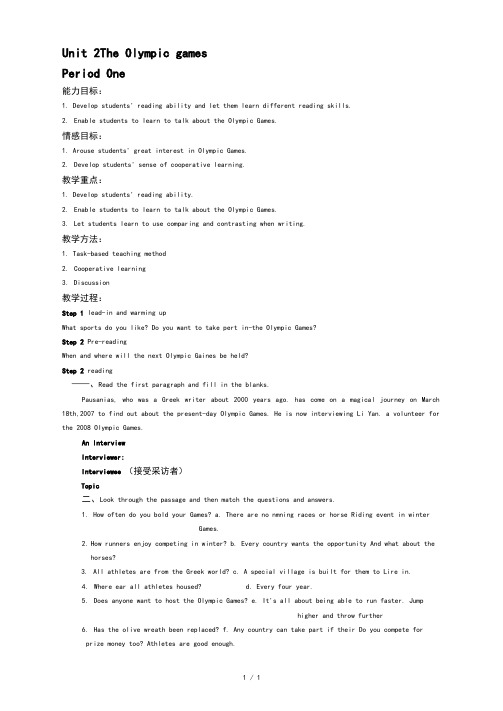
Unit 2The Olympic gamesPeriod One能力目标:1.Develop students' reading ability and let them learn different reading skills.2.Enable students to learn to talk about the Olympic Games.情感目标:1.Arouse students' great interest in Olympic Games.2.Develop students' sense of cooperative learning.教学重点:1.Develop students' reading ability.2.Enable students to learn to talk about the Olympic Games.3.Let students learn to use comparing and contrasting when writing.教学方法:1.Task-based teaching method2.Cooperative learning3.Discussion教学过程:Step 1 lead-in and warming upWhat sports do you like? Do you want to take pert in-the Olympic Games?Step 2 Pre-readingWhen and where will the next Olympic Gaines be held?Step 2 reading——、Read the first paragraph and fill in the blanks.Pausanias, who was a Greek writer about 2000 years ago. has come on a magical journey on March 18th,2007 to find out about the present-day Olympic Games. He is now interviewing Li Yan. a volunteer for the 2008 Olympic Games.An InterviewInterviewer:Interviewee (接受采访者)Topic二、Look through the passage and then match the questions and answers.1.How often do you bold your Games? a. There are no nmning races or horse Riding event in winterGames.2.How runners enjoy competing in winter? b. Every country wants the opportunity And what about thehorses?3.All athletes are from the Greek world? c. A special village is built for them to Lire in.4.Where ear all athletes housed? d. Every four year.5.Does anyone want to host the Olympic Games? e. It's all about being able to run faster. Jumphigher and throw further6.Has the olive wreath been replaced? f. Any country can take part if their Do you compete forprize money too? Athletes are good enough.From the questions and answers, we learn something about modern Olympics andOlympics.三、Scan the text and fill in the table.Compare ancient and modern Olympic Gamesthe main ideaIn this lesson, we learn the and between Ancient Olympics and ModernOlympics.四、Answer the following questions1.When pausanias hears that women are allowed to join in, what does he say? How about his feeling, sad, surprised or happy?2.Why does Pausanias think Li Yan should feel proud?3.Why does think people may be competing for money in the modern Olympic Gaines?Step IV: Read the beginning and ending of the interview dialogue)An Interviewbeginning: self-introductionStructure ^niddle: questions + answersEnding: expressing thanksStepV: Interview ActivitySupppose (假设)one is Li Yan and the other is PausaniasUseful expressions:My name is..., I am from...,May I ask you some questions about...?How often ...?Thank you so much for your time.StepVI:SummaryThe Olympic Games are the biggest sports meeting in the world, which Include two kinds, the and. Both of them are every _. All countries can take part if their athletesreached the for their event. Women are not only to join in but playing a veryrole. A village is built for the competitors to live in. It s a great to host the OlympicGames. The olive wreath has been by medals. But it's still about being bale to run,jump and throw.Step VH:Homework1.Remember to finish the self-evaluation.Period two三维目标知识目标2.Get students to know the structure of the present future passive voice.3.Let students learn the usages of the present future passive voice.能力目标Enable students to use the present future passive voice correctly and properly.情感目标1.Get students to become interested in grammar learning.2.Develop students , sense of group cooperation.教学重点Enable students to learn how to use the present future passive voice correctly.教学难点1.Task-based teaching method2.Cooperative learning and practice教学方法教学过程Step 1 Grammar revision1.Review the passive voice1)the present passive voice: am/ is/ are + p.p.2)the present continuous passive voice: am/ is/ are + being + p.p.2.Fill in the blank with the right form of the verb given.1)Their house(paint) and they have to live with their parents.2)Visitors(request) not to touch the exhibits.3)In some parts of the world, tea(serve) with milk and sugar.4)The news article ____ (write) at present.Suggested answers:l )is being painted 2) are requested 3) is served 4) is being written3.Do Page 13 Exercise 3 to review the passive voice by making a poster.Step 2 Grammar learning1.Reading aloud and discoveringAsk students to turn back to page 9 to go through Pre-reading and the passage An Interview. Let them pick out the sentences in the present future passive voice and translate them into Chinese.2.Looking and thinkingLet students look at the tense used in the sentences they picked out and think over this question: What is the stnicture of the present future passive voice?3.Summing upThe stnicture of the present future passive voice is “s hall/ will + be + It is a combination of thefuture tense and the passive voice. We also can use the structure "is/ anV arc to be + p.p.’Tor the present future passive voice.Step 3 Grammar practice1.Turn to page 13. Ask students to do Exercise 2 to help the officials make some rules for the Olympic Games, using the present future passive voice.2.Turn to page 50. Ask students to do Exercise 1 and Exercise 2. Check the answers after most of them finish.Step 4 Closing down by consolidation exercisesTurn the following sentences into passive voice.l)Tliey will put up a notice on the wall.2)Have you sent for a doctor?3)I have never heard of such a thing before4)We must take good care of the children here.5)His classmates laughed at him for the foolish mistake.Suggested answers:1) A notice will be put up on the wall.2)Has the doctor been sent for?3)Such a thing has never been heard of before.4)The children must be taken good care of here.5)He was laughed at for the foolish mistake by his classmates.Step 5 Summary1.一般将来时的被动语态的用法:(1)表示根据计划或者安排将要发生的被动动作。
必修2Unit2-The-Olympic-Games-单元教案

Unit2 The Olympic GamesTeaching aims:Knowledge aims:1. Get Ss to learn the useful new words and expressions in this part.2. Let Ss learn about the basic knowledge on the Olympic Games.Ability aims:1. Develop Ss’ reading ability and let them learn dif ferent reading skills.2. Enable Ss’ to learn to talk about the Olympic Games.Emotional aims:1. Arouse Ss’ great interest in the Olympic Games.2. Develop Ss’ sense of cooperative learning.Important points:1. Let Ss learn more about the basic knowledge on the Olympic Games.2. Get Ss to learn different reading skills.Difficult points:1. Develop Ss’ reading skilling.2. Enable Ss to learn to talk about the Olympic Games.3. Let Ss learn to use comparing and contrasting when writing.Teaching methods:1. Task-based teaching method2. Cooperative learning3. DiscussionTeaching aids:Normal teaching toolsTeaching ProceduresStep1 Lead-inListen to a song and guess what purpose it is used for.(You and Me) It’s the theme song sung in the 2008 Beijing Olym pic Games. Show pictures about “The Olympic Games”, let Ss name them out in English.Torch MascotWhat do you know about the ancient Olympic Games? Do you want to know some details about it? Then work in pairs and ask each other the following questions.1. Where did the ancient Olympic Games start? Olympia (Greece)2. How many countries competed in the ancient Olympic Games? One (Greece)3. Who could not take part in the ancient Olympic Games?Slaves and women (except the chariot)4. When and where did the modern Olympic Games start? Athens in 18965. Who was china’s first gold medal winner and for what event?Xu Haifeng for shooting6. What are the three words that show the spirits of the Olympic Games?Swifter, higher and stronger7. What do the five rings on the Olympic flag stand for? The five continents8. What are the official mascots for the Beijing Olympic Games?The five mascots are officially called the Five Friendlies. They are Beibei, the fish; Jingjing, the panda; Huanhuan, the Olympic flame; Yingying, the Tibetan antelope; and Nini, the swallow.Step2 Pre-readingNow, we have known some knowledge about the ancient Olympic Games. Do you know any differences between the ancient and modern Olympic Games? We will find out the answers after finishing the reading. Firstly, look at the title and the pictures and predict what the passage is about?Step3 ReadingTask1. Skimming for the general idea of each paragraphListen to the tape and match the main idea of each paragraph. {名师P17}1.Para.1( B ) A. Pausanias’s interview with Li Yan about the similaritiesand differences between the ancient and modern Olympic Games.Para.2 ( A ) B. Brief introduction of Pausanias.2. What is the text mainly about? ( D ) {名师P16.2}A. Telling the history of the Olympic Games.B. Telling the fairy tale of the ancient and modern Olympics.C. Telling the similarities between the ancient and modern Olympics.D. Telling the differences and similarities between the ancient and modern OlympicsTask2 Scanning for detailed informationKeys: 1.four 2.four 3.winter 4. More 5.Greek 6.all over the world 7.women 8.Every country is possible 9.The olive wreath 10.MedalsStep4.DiscussionDiscuss this question in groups: Why do many countries want to host the Olympic Games while others do not? Step 5 Summary of the interviewThe Olympic Games are the biggest sports meeting in the worlds, which include two kinds, the ________and the ______ Olympics. Both of them are _____ every _____ ______. All countries can take part if their athletes reached the ___ to the games. Women are not only _______ to join in but playing a very ____ role. A ______ _______ village is built for the competitors to live in, a ________ for competitions, a large swimming pool, a _____ as well as seats for those who watch the games. It’s a great _____ to host the Olympic Games.The Olive wreath has been _________ by medals. But it’s still about being able to run ______, jump ______ and throw _______.Keys: the Summer Olympic Games; the winter Olympic Games; held; four years; standard to be admitted;important; special; stadium; gymnasium; honour; replaced; higher; furtherStep6.Homework1.Do the exercises of page16 {名师P.4.5}2.Read the passage AN INTERVIEW after class.Learning about important language PointsTeaching aims:Knowledge aims:1.Get Ss to learn and grasp the important and useful new words and expressions in bold in this part:ancient,compete,medal,volunteer,Greece,homeland,regular,basis,athlete,admit,slave,nowadays,gymnastics,s tadium,gymnasium,host,responsibility,replace,swift, take part in, stand for, as well2. Let Ss learn the following important and useful sentences patterns.3. Get Ss to learn about the word formation.Ability aims:1. Get Ss to use some useful new words and expressions correctly.2. Enable Ss’ to make sentences with the useful sentence patterns,3. Let Ss learn to use the word formation.Emotional aims:1. Stimulate Ss’ interest in learning English.2. Develop Ss’ spirit of cooper ation and teamwork.Important points:1. Enable Ss to grasp the usages of such important new words and expressions2. Get Ss to master the patterns mentioned above.Difficult points:1. Let Ss learn the usage of the expressions.2. Enable Ss to understand some difficult and long sentences.Teaching methods:1. Task-based teaching method2. Cooperative learning3. DiscussionTeaching proceduresStep1 Revision1. Check the homework exercises.2. Ask some Ss to tell something about the similarities and differences between the ancient and modern Olympics.Step2 Language points1. compete vi. 比赛,竞争competition n. 竞赛competitor n. 参赛者competitive adj. 竞赛的compete with/against 与……竞争compete for…为……而竞争e.g.: That way, they can compete for better jobs.这样,他们可以竞争比较好的工作。
人教版高中英语必修2Unit2TheOlympicGames课文要点教案新
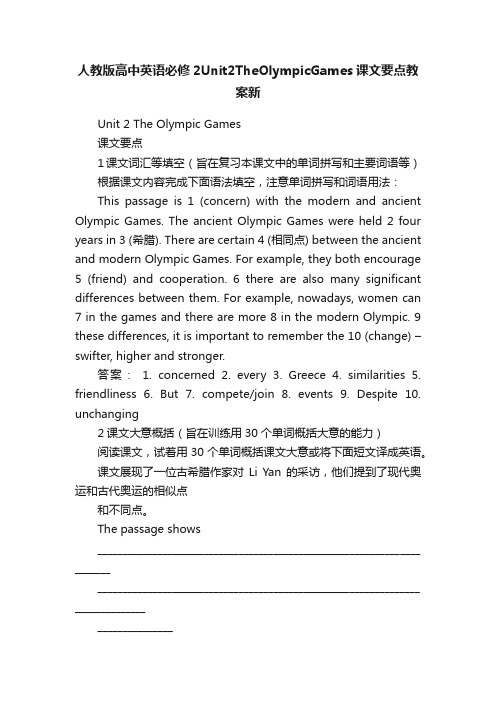
人教版高中英语必修2Unit2TheOlympicGames课文要点教案新Unit 2 The Olympic Games课文要点1课文词汇等填空(旨在复习本课文中的单词拼写和主要词语等)根据课文内容完成下面语法填空,注意单词拼写和词语用法:This passage is 1 (concern) with the modern and ancient Olympic Games. The ancient Olympic Games were held 2 four years in 3 (希腊). There are certain 4 (相同点) between the ancient and modern Olympic Games. For example, they both encourage 5 (friend) and cooperation. 6 there are also many significant differences between them. For example, nowadays, women can 7 in the games and there are more 8 in the modern Olympic. 9 these differences, it is important to remember the 10 (change) –swifter, higher and stronger.答案: 1. concerned 2. every 3. Greece 4. similarities 5. friendliness 6. But 7. compete/join 8. events 9. Despite 10. unchanging2课文大意概括(旨在训练用30个单词概括大意的能力)阅读课文,试着用30个单词概括课文大意或将下面短文译成英语。
高中英语人教版必修二第二单元unit2-The-Olympic-Games
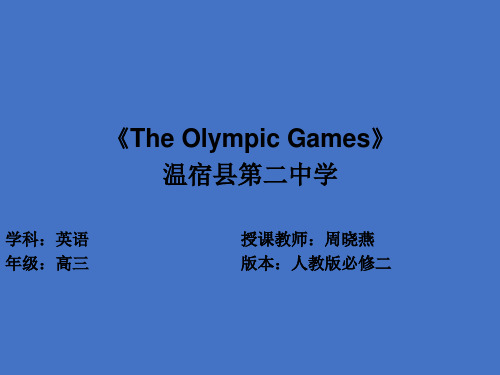
the exercise
• 1,More than two hundreds a______ c______ in the Olympic Games.
• 2.He is a_______to XinJiang university.
Olympic torch 火炬
Olympic flame奥运圣火
• The fire represents life and enthusiasm.
• 圣火象征着发源于古希腊 的文明之光, 它照耀着人类 前进的道路, 激励着人类追 求光明、追求理想,朝着 崇高的目标不断进取。
Olympic medals
《The OlHale Waihona Puke mpic Games》 温宿县第二中学
学科:英语 年级:高三
授课教师:周晓燕 版本:人教版必修二
How much do you know about the Olympic Games?
What do the five rings on the Olympic flag stand for?
• 8.glory→glorious • 9.pain→painful • 10.motto→saying/p
roverb • 11.admit→admissi
on • 12.responsibility→r
esponsible
Other wors
• 13.foolish→fool
• 14.magical→magic
medals decorated with jade
silver
gold
bronze
人教版必修2Unit 2 The Olympic Games第二篇课文知识点

Unit 2 The Olympic Games第二篇课文知识点课题: Unit 2 The Olympic Games (模块2)学习目标: Go on learning the text (学习课文知识点)教学重点:知识点的落实与巩固课前准备课本Page14课文Teaching Steps ;(教学步骤)Step 1 Have a check (检查)1核对56导学案的当堂检测2 核对课本Page14课文的练习题答案Step 2 Go on learning the text language points (继续学习知识点)下面的知识点让你们自学,不是不重要,而是比较简单,而且老师给出了英汉对照,关键是要争分夺秒,用最短的时间记住它们。
1 win glory for 为。
赢得荣誉2 make a bargain with 和。
讨价还价3 run past sb. 超过某人4 promise to do sth. 许诺做某事5 ask sb. for help 请求某人做某事6 one after another 陆续的一个接一个one another 互相=each other7 deserve to win the race 理应赢得比赛8 a short passage enititled “My favourite sport”过去分词作定语标题为《我最喜欢的运动》的文章9 apart from \besides \except 词汇辨析besides :in addition to (sb/sth) 除(某人[某事物])之外(还有):We all went to the Great Wall yesterday besides \ TOM.。
除了TOM之外我们都去了长城(TOM也去了)except (sb/sth); apart from 除(某人[某事物])之外(没有): We all went to the Great Wall yesterday except TOM.。
高中英语大题精做02Unit2TheOlympicGames(含解析)新人教版必修2(new)
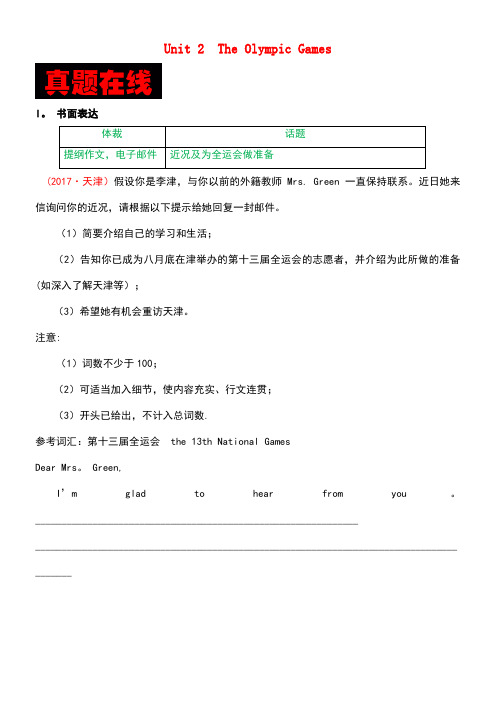
Unit 2 The Olympic GamesI。
书面表达体裁话题提纲作文,电子邮件近况及为全运会做准备(2017·天津)假设你是李津,与你以前的外籍教师Mrs. Green 一直保持联系。
近日她来信询问你的近况,请根据以下提示给她回复一封邮件。
(1)简要介绍自己的学习和生活;(2)告知你已成为八月底在津举办的第十三届全运会的志愿者,并介绍为此所做的准备(如深入了解天津等);(3)希望她有机会重访天津。
注意:(1)词数不少于100;(2)可适当加入细节,使内容充实、行文连贯;(3)开头已给出,不计入总词数.参考词汇:第十三届全运会 the 13th National GamesDear Mrs。
Green,I’m glad to hear from you。
_______________________________________________________________________________________________________________________________________________ ________________________________________________________________________________________ ________________________________________________________________________________________ ________________________________________________________________________________________ ________________________________________________________________________________________ ________________________________________________________________________________________ ________________________________________________________________________________________ ________________________________________________________________________________________ _______Yours,Li Jin 【参考范文】Dear Mrs。
英语必修2Unit2-TheOlympic-games

人民教育高中英语必修2Unit2 The Olympic Games第一课时说课稿2018.10.28The Interpretation of the First Lessonof Unit2 The Olympic Games一、说教材本课是人民教育高中英语必修2第2单元的第一课时,本单元的话题是奥运会及体育运动,旨在让学生通过文本感受奥运知识和体育文化,使学生能用英语就奥运会的基本知识进行互相问答,并能对其进行简述。
第一课时首先是要引入本单元话题并进行阅读课的教学。
在阅读课中首先训练学生从整体上把握文章大意及查找文章细节的能力。
二、说学生我所任教的班级里的大部分学生具备一定的英语听、说、读、写能力,但他们的自学能力差,阅读量偏少,阅读面较窄,导致阅读理解的速度和准确性欠佳。
这就需要老师深挖教材,给他们创造更多的机会练习使用所学知识表达他们的想法、情感,同时培养他们的自学能力和合作学习能力,从而进一步提高学生的阅读理解能力。
三、说教学目标与要求1.知识目标①学生能用英语简述奥运会的基本知识并进行互相问答。
②学生能用英语列举出各3个以上古代奥运会和现代奥运会的异同。
③在老师的提示与帮助下,学生能从整体上把握文章容,并能能理解几个长难句。
2.能力目标①学生的英语口头表达能力及阅读能力有所提高。
②学生逐步学会自主学习,生生之间的小组合作学习能力逐渐增强,两者能相辅相成,共同服务于学生的学习过程。
3.情感目标①学生对体育运动的兴趣有所增加,并能加强日常的体育锻炼,强身健体。
②学生明白奥林匹克格言的意义:夺取第一并不是要优先考虑的事,但全力以赴并为取得个人最好成绩而奋力拼搏却是值得追求的目标。
四、说教学重点与难点1.学生用自己的话表达对奥运会这一话题的观点和想法。
2.如何教会学生相关的阅读方法从而提高其阅读理解能力。
五、说教学方法1、交际法语言就是用来交际的。
应尽量给学生以足够的听、说的机会,联系课文实际,创设情景,引入讨论主题,在交际中学英语。
- 1、下载文档前请自行甄别文档内容的完整性,平台不提供额外的编辑、内容补充、找答案等附加服务。
- 2、"仅部分预览"的文档,不可在线预览部分如存在完整性等问题,可反馈申请退款(可完整预览的文档不适用该条件!)。
- 3、如文档侵犯您的权益,请联系客服反馈,我们会尽快为您处理(人工客服工作时间:9:00-18:30)。
What
The
is the Olympic oath?
oath is “In the name of all competitors.I promise that we shall take part in this Olympic Games,respecting and abiding by the rules which govern them,committing ourselves to a sport with out doping and with out drugs,in the true spirit sportsmanship,for the glory of sport and the honour of our teams.”
Winter Sports: 1.biathlon 两项全能 2. skiing 3. luge 小型橇内滑雪 4.skating 5. curling 苏格兰冰上掷石游戏 6.ice hockey 冰上曲棍球 7.bobsleigh 长橇
Olympic Traditions
What
is the Olympic motto?
What
is the Olympic Spirit?
The Olympic Spirit is the spirit of mutual and understanding friendship,solidarity and fair play.
What
is the meaning of the five interlocked rings?
10.judo(柔道) 11. hockey(曲棍球) 12.football 13. equestrian(骑手) 14.gymnastics (体操运动) 15.rowing(划船) 16.fencing(剑术) 17.modern pentathlon(五项全能) 18.handball
19. weightlifting 20.shooting 21.tennis 22.triathlon(三项全能) 23.taekwondo(跆拳道) 24. table tennis 25.sailing 26. wrestling(摔跤) 27.softball(垒球) 28.volleyball
The Olympic motto “Swifter,Higher,Stronger.” Expresses the aspirations of all the athletes in the Olympic Movement.
What
“The
is the Olympic creed?
most important thing is the Olympic Games is not to win but to take part.Just as the most important thing in life is not the triumph but the struggle.The essential thing is not to have conquered but to have fought well.”
P E T I T I O N M P I C V E O R M E S A R B M I N E O E N T D E N T S N T L
That's
all.Thank you !
The five interlocked rings represent the continents of Asia,Africa,Australia,Europe,and the Americas.
O L Y M P I C S
C OM P A R A L Y T O K Y O MO P R Olympic Spirit
Session 1 Getting Started
Sports events covered in summer Olympic Games:
1.boxing 2.cycling
6.baseball 7.basketball
3.canoe(独木舟) 8.athletics(运动) 4.archery(箭术) 9.badminton 5.aquatics(水上运动)
